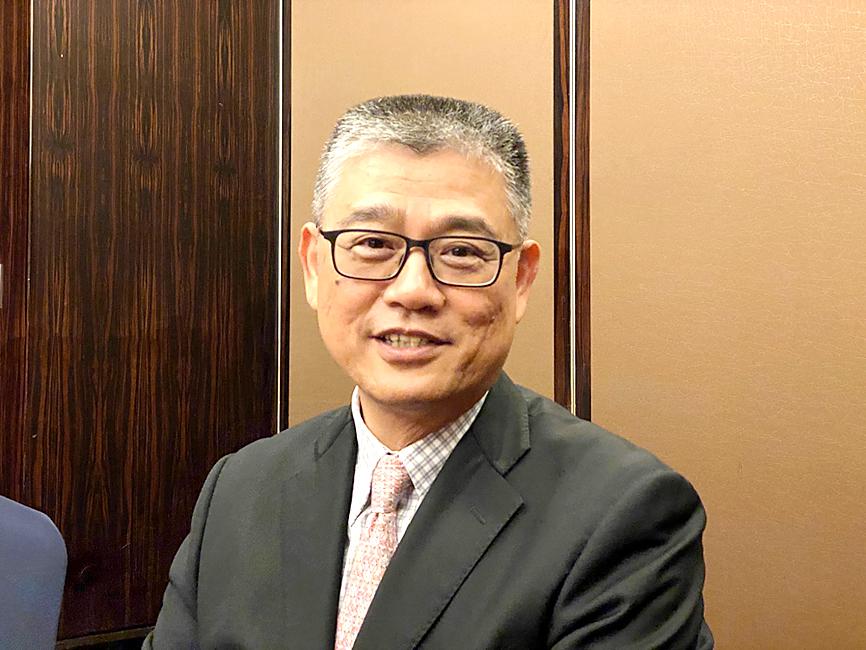Rugged PC vendor Getac Technology Corp (神基) yesterday forecast that its sales would increase “by double digits” this year, despite supply chain difficulties.
During the company’s online shareholders’ meeting, Getac chairman James Hwang (黃明漢) said that he is “pinning his hopes on the return of the US and Europe commercial market” for the second half of this year.
“The company is targeting 6 to 12 percent growth in revenue year-on-year in 2021,” Hwang said. “It’s tough, but doable.”

Photo: CNA
Getac, which was founded in 1989, produces rugged computers, mechanical components, aerospace fasteners and automotive components.
The rugged computers are designed for use in difficult environments such as in the military, medical and transportation sectors in which devices need to be water, dust and impact proof.
Hwang forecast increased demand for the company’s rugged computers as Europe and the US reopen for business.
“In the second quarter we are beginning to see more orders and an increase in demand from military and police users in Europe and the US,” Hwang said. “I remain upbeat about the second half of 2021.”
Hwang said that he expects rugged computer sales to grow by 8 to 10 percent for the whole of this year.
“Components shortage is still the wild card,” he said.
While demand for automotive components is being affected by the semiconductor shortage, Hwang said the company still hopes to reach double-digit percentage growth in sales in the segment this year.
“We have seen some delays in the orders, but demand is still there,” he said.
Hwang said that he expects sales of mechanical and electrical parts to remain mostly flat.
As raw material prices and logistical costs increase, Getac is in “rolling discussions” with customers about price increases, Hwang said, adding that most of the company’s customers are aware of the issues.
“Some products have to go up in price,” Hwang said. “After good communication with clients, they understand they must absorb some of the cost increases.”
Getac reported revenue of NT$2.27 billion (US$81.05 million) for last month, up 1.82 percent year-on-year.
Revenue in the first six months of the year was NT$14.91 billion, up 14.72 percent year-on-year.

SEMICONDUCTORS: The German laser and plasma generator company will expand its local services as its specialized offerings support Taiwan’s semiconductor industries Trumpf SE + Co KG, a global leader in supplying laser technology and plasma generators used in chip production, is expanding its investments in Taiwan in an effort to deeply integrate into the global semiconductor supply chain in the pursuit of growth. The company, headquartered in Ditzingen, Germany, has invested significantly in a newly inaugurated regional technical center for plasma generators in Taoyuan, its latest expansion in Taiwan after being engaged in various industries for more than 25 years. The center, the first of its kind Trumpf built outside Germany, aims to serve customers from Taiwan, Japan, Southeast Asia and South Korea,

POWERING UP: PSUs for AI servers made up about 50% of Delta’s total server PSU revenue during the first three quarters of last year, the company said Power supply and electronic components maker Delta Electronics Inc (台達電) reported record-high revenue of NT$161.61 billion (US$5.11 billion) for last quarter and said it remains positive about this quarter. Last quarter’s figure was up 7.6 percent from the previous quarter and 41.51 percent higher than a year earlier, and largely in line with Yuanta Securities Investment Consulting Co’s (元大投顧) forecast of NT$160 billion. Delta’s annual revenue last year rose 31.76 percent year-on-year to NT$554.89 billion, also a record high for the company. Its strong performance reflected continued demand for high-performance power solutions and advanced liquid-cooling products used in artificial intelligence (AI) data centers,

Gasoline and diesel prices at domestic fuel stations are to fall NT$0.2 per liter this week, down for a second consecutive week, CPC Corp, Taiwan (台灣中油) and Formosa Petrochemical Corp (台塑石化) announced yesterday. Effective today, gasoline prices at CPC and Formosa stations are to drop to NT$26.4, NT$27.9 and NT$29.9 per liter for 92, 95 and 98-octane unleaded gasoline respectively, the companies said in separate statements. The price of premium diesel is to fall to NT$24.8 per liter at CPC stations and NT$24.6 at Formosa pumps, they said. The price adjustments came even as international crude oil prices rose last week, as traders

SIZE MATTERS: TSMC started phasing out 8-inch wafer production last year, while Samsung is more aggressively retiring 8-inch capacity, TrendForce said Chipmakers are expected to raise prices of 8-inch wafers by up to 20 percent this year on concern over supply constraints as major contract chipmakers Taiwan Semiconductor Manufacturing Co (TSMC, 台積電) and Samsung Electronics Co gradually retire less advanced wafer capacity, TrendForce Corp (集邦科技) said yesterday. It is the first significant across-the-board price hike since a global semiconductor correction in 2023, the Taipei-based market researcher said in a report. Global 8-inch wafer capacity slid 0.3 percent year-on-year last year, although 8-inch wafer prices still hovered at relatively stable levels throughout the year, TrendForce said. The downward trend is expected to continue this year,